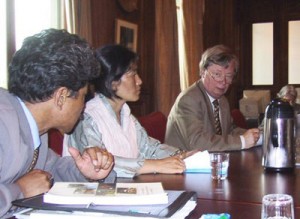
Ngawang Sangdrol delivers her statement to Prof. Jacob Egbert Doek, Chair of the UN Committee on the Rights of the Child.
Nima Taylor began by emphasizing the need to understand human rights abuses in Tibet in the context of China’s efforts to fight Tibetan independence by systematically repressing expressions of the Tibetan identity and by flooding Tibet with Chinese settlers. He then spoke on violations of the right to education in Tibet, and concluded by making specific proposals for the Committee to follow up with the Chinese government when China appears before the Committee in September.
Kelley Currie focused on China’s abduction of Gedhun Choekyi Nyima, the 11th Panchen Lama, as a specific example of China’s blatant violation of Tibetan children’s rights in the area of arbitrary detention and religious repression. She noted that the Committee was one of the first international bodies to address the case of the Panchen Lama’s abduction during the consideration of China’s first periodic report in 1995, and urged the Committee to make a specific inquiry to the Chinese government regarding access to the Panchen Lama as part of its review of China’s report.
Along with other groups present, the representatives from ICT and TJC then answered questions from individual members of the Committee. During a private meeting this afternoon, former teenage political prisoner and victim of torture Ngawang Sangdrol gave members of the Committee a presentation on her first-hand experiences with the prison Chinese system.
“In Tibet, there is no freedom of expression, to say nothing of the rights of the child. I am very happy to have the opportunity to talk to the Committee today about the case of the Panchen Lama and the repression of Tibetan children. It was a very personally rewarding experience for me to see their interest and to be able to express these things to these important UN experts on childrens’ rights,” said Ngawang Sangdrol, after her extensive discussions with the Committee members.

